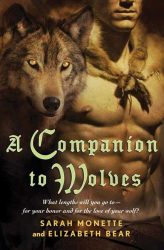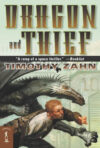Summary: The only things that stand between the men of the North and a gruesome death at the hands of trolls are the wolfheallan. Feared by those they are duty-bound to protect, each wolfheall is a pack of men (wolfcarls) and their bonded trellwolves. Through this bond, man and animal share everything, sense, thought, emotion.
The jarl of Nithogsfjoll, Lord Gunnarr, hoped to save his son, Njall, from joining this clan of beasts who, it was said, engaged in lurid acts between men that no real man could countenance. But Njall would not shirk his duty to his country, and he set out to join the wolfheall to find a brand of honor all his own.
Commentary: Now this was a surprise. Here is one of those rare books not produced as a precursor to a series.
This is not to say that the land Monette and Bear have created couldn’t support multiple visits. It is merely to say that they have constructed a tale that is complete and unconcerned with possibilities and marketing strategies beyond its own ken.
I hope the authors would not find it naive of me to say it, but I truly feel that the story of this book is that of Njall (called Isolfr after bonding), son of a king, learning to grow up to be a proper woman and mother. You see, there are only men in the wolfheall. Most bond to male trellwolves, as these are the most common. Some bond to female wolves, ensuring them a life far different from their brothers. And a very few bond to konigenwolves — queen wolves destined to lead their own packs.
In the politics of the pack, the konigenwolf is leader among the wolves. She chooses a consort. And the brother to that consort becomes wolfjarl, leader of the men of the pack. Her choice determines the pecking order, even though the men defer to the wolfjarl.
Isolfr bonds to a konigenwolf pup named Viradechtis. And he learns rather early on what the bother to a konigenwolf’s job as wolfsprechend will be. It is his duty to read the thoughts and politics of the wolves. It is his duty to pacify anger, stop arguments before they become issues, and keep order among the pack. Without a constant vigilance toward attitudes and desires, wolves will try to usurp one another’s place, causing rifts between the pack as a whole.
It is also Isolfr’s fate, he comes to find out, to be the center of attention when his sister comes into heat. There is little either he or the other men of the wolfheall can do to stop one another from what is essentially a gang rape driven by the bonded wolves’ needs. He also becomes the center of attention for every wolfcarl when it comes time for Viradechtis to choose her consort and start her own pack. Of the many lessons he must learn in patience, in caring, he also learns, albeit slowly, that which is classically considered to be a woman’s power: the manipulation of another’s sexual desire as a form of control.
I might feel a bit more outlandish in this reading were it not for the fact that gender politics came up constantly throughout the book. Through the matriarchal troll and svartalfar societies, Isolfr sees communities in which females are warriors, smiths, and leaders. This is in contrast to the world humans, where they were denigrated as mere household workers, an attitude that Isolfr once shared. What could his mother know of honor, he once asked.
His final request at the end of the book reflects this shift in perception.
Oh. And before I forget, or make it sound like the book is one long slashy love-fest, there’s also a war going on. Towns are burned as the trolls push into new territory. And the wolfheallan are stretched to their limit trying to protect as many innocents as they can. It’s a bloody and desperate campaign — one the wolfjarls are all sure that they will lose. Friends and lovers die. And Isolfr finds himself having to spurn those he cares about most in order to follow a wild idea that he’s sure will save them all.
His journey, as it always seems to be, is toward building bonds, understanding, and friendship — the traditional feminine motif. But this is not to say that he is fey, let me be clear, simply that his choices and methods for heroism are circumscribed by the duty he has been given. And if anything, the book aims to show that Isolfr is not just a man despite these qualities, but that the very definition of what it is to be a strong man can incorporate them without disintegrating.
A Companion to Wolves was not only a great adventure, but a surprisingly thoughtful one. Though given its authors, I should hardly have been surprised at all.
 A Companion to Wolves by Sarah Monette and Elizabeth Bear
A Companion to Wolves by Sarah Monette and Elizabeth Bear
Published by: Tor Books (Oct 16, 2007)
ISBN-10: 0765318164
ISBN-13: 978-0765318169
Genre: Fantasy




